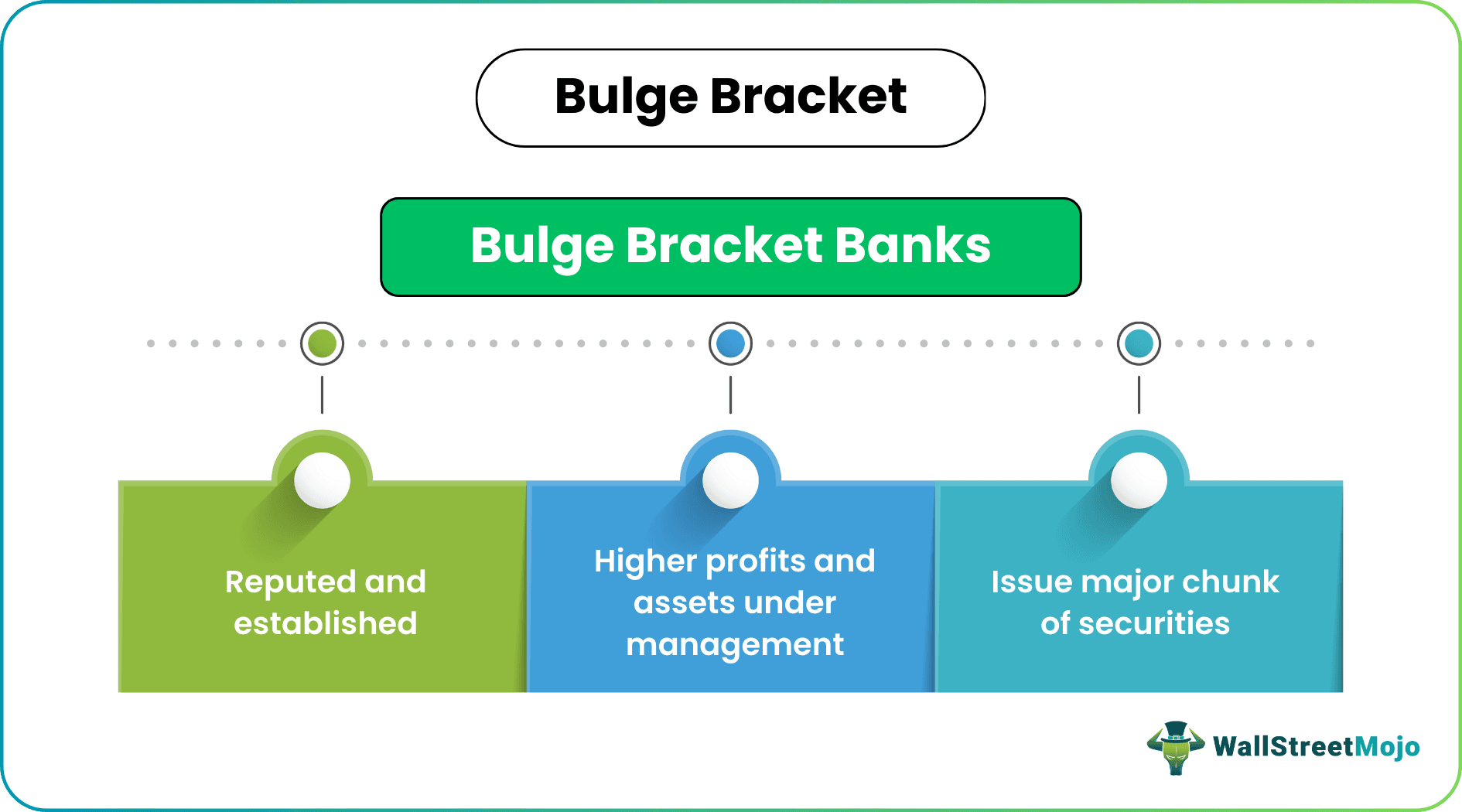Table Of Contents
Bulge Bracket Meaning
Bulge bracket firms refer to the world's largest and most profitable investment banks with a large clientele. These top-tier firms provide diverse financial services to institutional investors, large corporations, etc. Examples of bulge bracket firms include Goldman Sachs, JPMorgan Chase, Morgan Stanley, and Barclays.

The term generally indicates firms involved in underwriting syndicates and major investment banks. A firm with the tag bulge bracket generally is a multinational bank offering a broad category of services and products, including trading securities, M&A advisory, debt syndication, research activities, underwriting, and the sale of financial products such as equities, commodities, and other derivatives.
Bulge Bracket Banks Explained
Bulge bracket banks are one of the three types of investment banks. The other two are middle-market banks and boutique banks. This classification is based on their size, scope, and specialization.
Bulge-bracket investment banks are the most well-known investment banking institutions. Thus, they are reputed, well-established, have a global customer base, and serve large corporates and institutional investors. They also make high profits and have assets worth trillions under management. The term points to the top tier of investment banks, but the exact definition of what makes a bank a bulge bracket bank can vary depending on the source and context.
A noteworthy feature of a bulge bracket bank is its global reach and size. These institutions manage billion-dollar transactions on a regular basis. They employ various professionals to ensure their operations around the world run smoothly. The worldwide presence enables them to offer their services to institutional clients and multinational corporations across multiple markets and various time zones. Moreover, it offers them unparalleled access to deal flow and market data, strengthening their position in the market.
There is a history behind its origin. Investment banking tombstones are a historical tradition of advertising the investment banks that issue securities of a particular company. The position of the banks in the tombstone does not necessarily indicate the number of securities they have sold, but rather reflects their role in the transaction. For example, the bank listed first may be the lead underwriter or the syndicate manager. Hence, they are printed in a larger font and in bold. Hence, the size and boldness of the font used to represent each bank in a tombstone may reflect their status and importance in the transaction. Still, it does not necessarily mean they are top investment banking institutions.
Since there is a lot of competition between these banks to stay at the top of the industry, they usually spend billions of dollars in perfecting many aspects of the firm. As a result, they employ the best talents from the world, attract capital, and stay ahead of the others in terms of newer technology. For instance, under their CEO Jamie Dimon, JPMorgan Chase has decided to spend at least $12 billion yearly on technology.
Services
These banks have garnered enormous popularity for their extensive range of services. Some of the core services offered by them are as follows:
- Deal Financing: These banks have the capability to finance and underwrite significant deals.
- Advisory Services: Bulge bracket banks offer strategic advice to companies on different financial matters, for example, risk management and capital raising.
- Initial Public Offering (IPO): Bulge bracket banks offer guidance to companies on how they can go through the entire process of an initial public offering smoothly.
- Underwriting Services: These banks bring new financial instruments to the financial markets, underwriting debt and equity offerings.
- Sales And Trading: The institutions have large trading floors for the execution of buy and sell orders for clients.
- Consumer Banking: Some of these banks provide individual consumers with retail banking services.
- Asset Management: This service involves managing portfolios of investments for high-net-worth or HNI individuals and institutional clients.
- Equity Research: These banks provide equity research services that involve conducting detailed analysis of industries and companies to facilitate informed investment decision-making.
- Investment Banking: The investment banking division of such banks is responsible for managing corporate restructuring, strategic advisory services, and mergers and acquisitions or M&As, for large institutions and corporations.
Individuals who are looking to improve their knowledge of concepts related to investment banking can enroll in the Investment Banking Mastery Program (IBMP). The program includes a series of courses, for example, ratio analysis, financial modeling, and more, to help you gain the key skills required to become a successful investment banker.
Examples
Let’s discuss some examples of bulge bracket investment banks:
Example #1
Goldman Sachs is one of the prominent banks in the fintech industry. According to press reports, Goldman Sachs participated in funding rounds totaling $95.5 million for the bitcoin startup circle, the payment cycle management company Billtrust, and the high-frequency trading network company Perseus in 2015. Additionally, the bank advised Funding Circle on its $150 million equity financing round in April 2015.
Example #2
Another example of a bulge bracket investment bank is JPMorgan Chase. It is considered one of the world's largest and most reputable investment banks, with a significant global presence in the banking industry. The bank has a significant market share in investment banking, capital markets, wealth management, and trading. Its size, reputation, and comprehensive range of financial services have made it one of the world's most well-known and influential banks, earning it a place in the bulge bracket of the investment banking industry.
Benefits
Some key advantages of working in these banks are as follows:
- By working in such banks, one can get access to large deals that are worth a substantial amount.
- One can get a lucrative compensation package by working in these banks.
- Individuals can gain significant reputation and value by working in such banks. Moreover, work experience in these organizations can make one’s professional profile stand out among other candidates.
- These banks usually have comprehensive training programs, and they make significant investments in developing entry-level and new hires. Generally, such programs cover an extensive range of skills and financial concepts, offering a strong foundation for a finance career.
Limitations
The disadvantages associated with bulge bracket are as follows:
- Professionals often need to work night and day to secure the transaction of clients and ensure the organization is profitable.
- If unfavorable market conditions materialize, these banks often ask their employees to leave. This lack of job security can be concerning for employees.
Bulge Bracket vs Boutique Bank
Boutique banks are those investment banks that specialize in any one aspect or category of financial services. For example, their expertise and experience in bond markets might even outplay those of top investment banks. But they might not show satisfactory results in equities, funds, etc. These banks are often considered the opposite of bulge-bracket investment banks. Let's distinguish the two in brief.
| Bulge Bracket Banks | Boutique Banks |
|---|---|
| Large and globally established multinational firms. | Small younger banks; focusing on niche markets. |
| Offers versatile financial services. | Offer personalized and specialized financial services. |
| Most of these companies are publicly listed. | Boutique banks are generally not large enough to be listed. |
| Boutique banks are generally not large enough to be listed. | They can target niche clientele.. |
| Flexibility to switch to other fields or diversify. | Flexibility may be restricted due to the firm’s limitations. |
| It charges high fees due to its reputation and diverse expertise. | Charges comparatively lesser fees. |
| Examples: Goldman Sachs, HSBC, Morgan Stanley, Barclays. | Examples: Allen & Company, Cowen, Lazard, etc. |
Bulge Bracket vs. Middle Market Bank
Individuals new to finance often have confusion regarding the meaning and characteristics of bulge bracket and middle market, or MM, banks. They can eliminate such confusion by knowing how they differ. So, let us look at their distinct features.
| Bulge Bracket Bank | Middle Market Bank |
|---|---|
| These banks work on larger deals. | Middle market banks work on smaller deals. |
| These banks have more exit opportunities. | Middle market banks have access to restricted exit opportunities. |
| These banks offer a wide range of services on a large scale. | The services offered are similar, but the scale of offering is smaller. |
| Typically, clients of these banks include institutional investors, companies. and high-net-worth individuals. | Generally, the clientele comprises mid-sized companies requiring capital raising or financial advisory services. |

